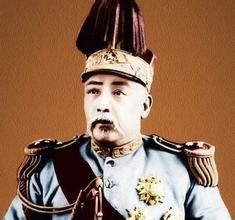(单词翻译:单击)
The Republic of China
中华民国
Early Republic
民国初期
On January 1, 1912, Sun officially declared the Republic of China and was inaugurated in Nanjing as the first provisional president.
1912年1月1日,孙中山正是宣布中华民国成立,并在南京就职第一任临时大总统。
But power in Beijing already had passed to the Commander-in-Chief of the imperial army and Qing prime minister, Yuan Shikai, the strongest regional military leader at the time.
然而此时北京清政府的权利已经转移到帝国军队总司令兼清总理袁世凯手中,袁世凯是当时最大的军阀,他要求中国各政党应该集中到他领导的北京政府下。
To prevent civil war and possible foreign intervention from undermining the infant republic, agreed to Yuar’s demand that China be united under a Beijing government headed by Yuan.
为了防止内战和潜在外国干预对新生的共和国造成破坏,孙中山答应了袁世凯的要求。
On February 12, 1912, the last Manchu emperor, the child Puyi, abdicated.
1912年2月12日,末代皇帝溥仪退位。
On March 10, in Beijing, Yuan Shikai was sworn in as the second provisional president of the Republic of China.
3月10日,袁世凯在北京宣誓就任中华民国第二任临时大总统。
The republic that Sun Yat-sen and his associates envisioned evolved slowly.
与孙中山和他的同仁们预想的相反,民主共和推进缓慢。
The revolutionists lacked an army, and the power of Yuan Shikai began to outstrip that of parliament.
革命者缺少一支军队,袁世凯的力量开始超过议会。
Yuan reused the constitution at will and became dictatorial.
他恣意重启封建律法,成为了一个独裁者。
In August 1912 the Kuomintang (KMT, Nationalist Party) was founded by Song Jiaoren, one of Sun’s associates.
1912年8月,孙中山的同仁宋教仁成立了国民党。
It was an amalgamation of small political groups, including Sun’s Tongmeng Hui.
它融合了很多小政治团体,包括孙中山的同盟会。
In the national elections held in February 1913 for the new bicameral parliament, Song campaigned against the Yuan administration, and his party won a majority of seats.
在1913年2月举行的新两院制国会选举中,宋教仁反对袁世凯的领导,国民党也赢得了多数席位。
Yuan had Song assassinated in March; he had already arranged the assassination of several pro-revolutionist generals.
袁世凯在3月派人暗杀了宋教仁,在此之前他已经组织了针对几个改革派将领的暗杀。
Animosity toward Yuan grew.
针对袁世凯的不满由此不断增加。
In the summer of 1913 seven southern provinces rebelled against Yuan.
在1913年夏,南方7省共同反对袁世凯统治。
When the rebellion was suppressed, Sun and other instigators fled to Japan.
在被镇压后,孙中山和其他策动者逃往日本。
In October 1913 an intimidated parliament formally elected Yuan president of the Republic of China, and the major powers extended recognition to his government.
1913年10月,袁世凯恐吓议会,当选共和国大总统,主要权利由议会转移到他的政府。
To achieve international recognition, Yuan Shikai had to agree to autonomy for Outer Mongolia and Tibet.
为了获得国际认可,袁世凯不得不同意蒙古和西藏的自治。
China was still to be suzerain, but it would have to allow Russia a free hand in Outer Mongolia and mongolia and Britain continuance of its influence in Tibet.
虽然中国拥有这些土地的主权,但无力阻止俄罗斯对外蒙古、内蒙古的控制和英国对西藏延续的影响。
In November Yuan Shikai, legally president, ordered the KMT dissolved and its members removed from parliament.
11月,总统袁世凯下令解散国民党,将其成员踢出议会。
Within a few months, he suspended parliament and the provincial assemblies and forced the promulgation of a new constitution, which, in effect, made him president for life.
在几个月内,他暂停议会和訾议会,并强行颁布新宪法,自己担任终生总统一职。
By the end of 1915, Yuan declared himself emperor.
1915年底,袁世凯称帝。

Widespread rebellions ensued, and numerous provinces declared independence.
这引起了来自各界的反对,很多省份宣布独立。
With opposition at every quarter and the nation breaking up into warlord factions, Yuan Shikai died of natural causes in June 1916, deserted by his lieutenants.
战乱四起,军阀割据,袁世凯被他的助手抛弃,于1916年去世。


